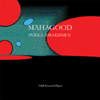Pekka Airaksinen, "Mahagood"
 Pekka Airaksinen has never been particularly well known outside of his native Finland, but he has the unique distinction of appearing not once, but twice on the legendary list that accompanied Nurse With Wound's debut album (once as himself, once as The Sperm). In the ensuing four decades since his heyday as an underground rock luminary, he has quietly released an avalanche of material on his own label (not mere hyperbole: he is attempting to release an album dedicated to each of the one thousand Buddhas), while toiling in relative obscurity. While I have no intention of plunging into the time- (and finance-) engulfing black hole of his back catalog just yet, I can happily report that Mahagood shows that the old fellow is still as vital and playfully skewed as ever.
Pekka Airaksinen has never been particularly well known outside of his native Finland, but he has the unique distinction of appearing not once, but twice on the legendary list that accompanied Nurse With Wound's debut album (once as himself, once as The Sperm). In the ensuing four decades since his heyday as an underground rock luminary, he has quietly released an avalanche of material on his own label (not mere hyperbole: he is attempting to release an album dedicated to each of the one thousand Buddhas), while toiling in relative obscurity. While I have no intention of plunging into the time- (and finance-) engulfing black hole of his back catalog just yet, I can happily report that Mahagood shows that the old fellow is still as vital and playfully skewed as ever.
Airaksinen’s output since his return to releasing music in the 1980s has been quite varied (veering into new age, house, and electro-jazz) and, by his own admission, occasionally trivial. Mahagood, however, is a wholly different animal. For one, Airaksinen has completely eschewed traditional instrumentation and has instead improvised an eclectic and plunderphonic avant-garde collage. Secondly, he has nostalgically cannibalized his early influences (swing jazz and early electronic music) for the bulk of the source material.
The album’s first track, “Water Is Best,” is built around a lurching and relentlessly deranged repetition of a big band saxophone snippet that is constantly intruded upon by discordant flutes, manipulated drums, and kitschy organ interludes. These themes (abruptly stopping and starting jazz loops, odd juxtapositions, and unexpected stabs of dissonance) remain consistent for the rest of the album. In fact, they are so consistent that the second track, “Nobody Is Free,” is almost indistinguishable from the first, except that it is enhanced by funky stand-up bass and builds up to some alien metallic dissonance before segueing into the beautifully disquieting and somewhat harsh path of “Let Your Anger Die Before You” and “Waves Follow Waves.”
Airaksinen threatens to return to a groove again with the blues-appropriating “Once I Was In Their House,” but deep foreboding strings and eruptions of dissonance quickly pervert the ebullient cut-ups into something entirely nightmarish before fading into the haunting ambiance of “Why All This Prelude.” Immediately afterwards, “Don’t Educate Your Children Too Smart” delivers exactly the sort of unsettling nocturnal jazz expected to be playing in the background at the brothel from Twin Peaks. The album is concluded with a palate-cleansing double-dose of violent surrealist sound pile-ups (the two-part “My Tongue Swore, My Mind Didn’t”) that make it quite clear why Stephen Stapleton would be a fan.
Mahagood works best when appreciated in its entirety, as there are constant revisitations of themes and samples throughout, but nearly all of the nine tracks are excellent when taken individually. Airaksinen’s masterfully kaleidoscopic shifts from playful mischief to disturbing darkness and back again are uniquely his own. This is a challenging and inspired work and I hope it finds the audience it deserves. Of course, Airaksinen probably won't notice if it does, as he will presumably be hard at work on the remaining nine hundred albums in his Buddha series.
Samples:



